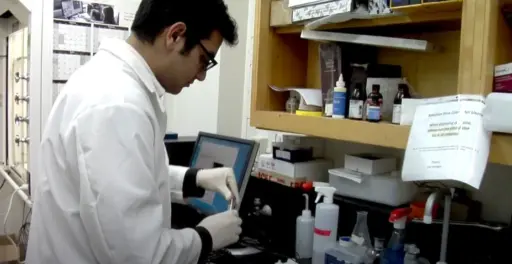Rahim Ansari has long held a love of the water.
The Madison, Wisconsin native has spent countless hours fishing and canoeing on the lakes and waterways around the city and on visits to Wisconsin’s state parks. During his junior and senior year in high school, Ansari worked as a student researcher under Wisconsin Distinguished Professor of Civil and Environmental Engineering Daniel Noguera. He always wanted to attend the University of Wisconsin-Madison, and seeing wastewater engineering up close in Noguera’s lab solidified his decision to pursue a civil engineering education.
So, too, did events one state over, in Flint, Michigan—as lead leaking into the city’s water system ignited a public health crisis that grabbed national attention.
 Rahim Ansari works on a project in CEE Professor Daniel Noguera’s lab. Ansari is a senior, and spent three years working with the Noguera lab group.
Rahim Ansari works on a project in CEE Professor Daniel Noguera’s lab. Ansari is a senior, and spent three years working with the Noguera lab group.
“I was a freshman in high school when the Flint water crisis unfolded,” Ansari says. “Watching that and seeing what can happen when these things are overlooked really struck home. A combination of all of these things really stuck with me and made me want to work with water.”
Now, Ansari is a senior and expects to graduate in August 2021. He’s accepted an offer to begin his career with MSA Professional Services as a water/wastewater engineer and says the position will allow him to follow his passions and continue to learn about water and wastewater treatment and design.
Ansari conducted research under Noguera for three years. While with the group, he worked on pilot-scale reactors at the Nine Springs wastewater treatment plant in Madison as well as in the lab. Pilot-scale reactors are used to cultivate specific microbial communities to efficiently remove nutrients from wastewater. Ansari oversaw one of the reactors and learned how they work.
“For an entire year, I was struggling with this bench scale reactor, but it was a really interesting process,” he says. “At one point, we had complete ammonia removal, which is to say this little bottle had all the microorganisms we needed to remove all of the ammonia we were feeding into it. I got to present those findings at the university’s undergrad research symposium.”
As a senior in Civil and Environmental Engineering Professor Jim Park’s wastewater plant design class, Ansari returned to the Nine Springs plant. This time, he asked the plant’s engineers what problems they were having and what facilities and systems at the plant needed optimization.
“I started my research at Nine Springs, and then I came back in my senior year with a design project to optimize the whole plant,” Ansari says. “In the end, my group created a full presentation and report to upgrade four different facilities at the plant. We addressed most of the issues the staff presented to us. That was really satisfying, and it was an interesting and fun project.”
Now that he’s a senior, Ansari mentors younger students, as upperclassmen did for him when he was new to the college. Due to personal challenges, he struggled his first two years in college, but support from his family, the college’s LEED Scholars program, his professors and fellow students helped get him through those tough times. He’s since made the Dean’s List multiple times, including the fall 2020 semester.
“One of best parts of the LEED Scholars program is that we have seniors mentoring freshmen—so people who have gone through it all talking to new students, and telling them that it can be tough, but everything is going to be ok,” he says. “No matter what happens, the faculty and administration here at the college want to see you succeed. They want to help you. You’re never really alone here—you have thousands of teammates who are cheering you on.”